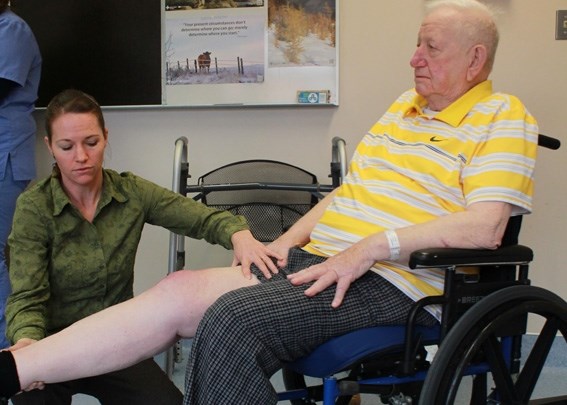Patients recovering from orthopedic surgery at Oilfields General Hospital no longer have to endure trips to Calgary for follow-up appointments.
The Black Diamond hospital is testing a program for patients to connect with Calgary surgeons via videoconference, eliminating the need to travel to the city for a consultation.
The pilot project began Jan. 28 and five patients have connected with an orthopedic surgeon each from Rockyview General Hospital and the South Health Campus via the $28,000 mobile practitioner cart, made up of a high-definition camera connected to a television screen. Alberta Health Services (AHS) covered the cost of the system.
“Almost every patient we’ve had has had some cognitive impairment, so them not having to leave and not having things communicated well, where maybe they can’t hear or don’t understand, has been hugely important,” said Carla Ralph, Oilfields General Hospital site manager.
“Families have appreciated it as well. Typically we have to send a family escort so if they still want to participate it’s way more convenient and there’s a lot more information because they have the whole team here and staff are feeling a lot more fulfilled because they are getting a lot more information.”
Ralph began looking into the possibility of virtual appointments for the hospital’s post-operative patients about a year ago and brought the idea to a Telehealth Services manager, who was upgrading Telehealth equipment used as an education tool for staff at the hospital last spring.
“She said, ‘What are the needs at this site?’ and I said, ‘This is what I’m thinking,’” she said. “She told me about the existence of the practitioner cart and I put together a proposal to trial something like that.”
Ralph said the hospital has many post-operative patients going through rehab and identified a need for this type of consultation. For many, they need regular consultation with a specialist up to six weeks after surgery.
“Usually EMS picks them up, transfers them to Calgary to see the specialist and, depending on transportation and doctor availability, it could take a couple of hours or a full day,” she said. “I think for some time, in my personal opinion and having conversations with other colleagues, it has not been the most efficient method of follow-up for people to get a clear understanding of the next step and the transportation piece has been an issue.”
With many of Oilfields’ post-operative orthopedic patients being elderly and frail and most suffering from dementia, Ralph said the transfer isn’t a pleasurable experience for patients.
“It can be an all-day procedure in an unfamiliar area,” she said. “Often when they come back they say, ‘I don’t know what the doctor said.’”
Ralph said the Oilfields General Hospital staff are also concerned about patient nutrition on the days they are transferred to Calgary for consultations.
“We send food, but it’s not the same as having a hot meal provided on site,” she said.
The other disadvantage to the EMS transfer is that it takes an ambulance out of the service area to transport the patient to Calgary and back, Ralph said.
Okotoks resident James Heembrock was one of the first patients at Oilfields General Hospital to benefit from the Alberta Health Service’s mobile practitioner cart.
The senior slipped on ice in early February while getting his mail near his Okotoks home, shattering his kneecap.
Three days following his surgery in Calgary, Heembrock was transferred to the Oilfields General Hospital for his rehabilitation, including daily physio, strength training and pain management.
Heembrock said he likes not having to transfer into Calgary for his appointments, adding his wife Stella wouldn’t have been able to join him.
“My doctor said I would likely lie in the hospital for the better part of the day,” he said. “This way it’s immediate. They don’t have to keep transferring people back and forth.”
Heembrock said he also likes that his physiotherapist and other caregivers at Oilfields can be in the room during the consultation to hear the doctor’s advice and suggestions toward his continued progression.
“Everyone that is involved is there and asking questions,” he said. “It’s cost effective and it’s efficient because everybody can be there. This is a much better way to do things.”
Heembrock doesn’t find the high-definition technology intimidating as both he and Stella frequently FaceTime with family members.
“It’s an amazing technique,” he said. “The program is well worth it, otherwise I would have to go back to the hospital twice already.”
Ralph said AHS offers the Telehealth technology for clinical operation in other remote communities across Alberta.
At Oilfields, the equipment is used once or twice a week and has the potential to expand to wound consults, mental health follow-ups and rheumatology consults that don’t require face-to-face, she said.
“Definitely over the next year we will review the usage and we will see the outcome and then definitely be able to try to expand the project,” she said.
Ralph said the financial savings potential, in the event the mobile clinical practitioner cart is used for as many consultations as possible, could reach $150,000 annually.



.JPG;w=120;h=80;mode=crop)
